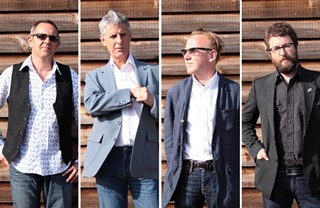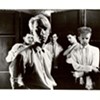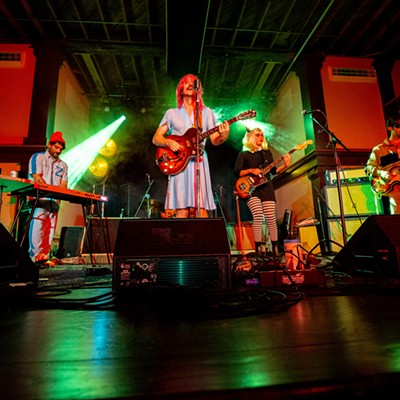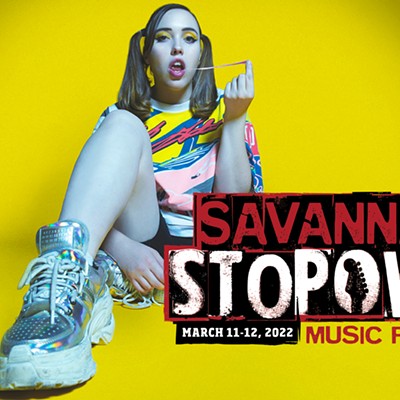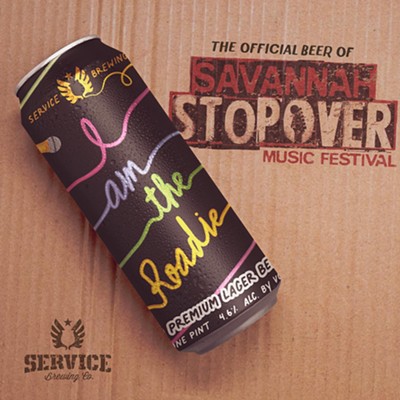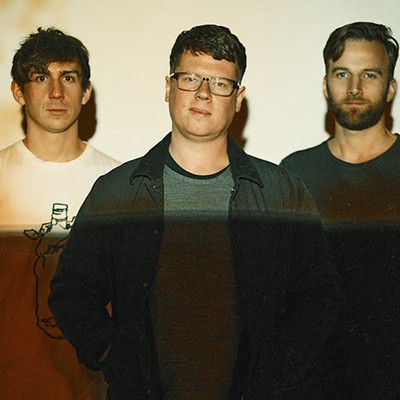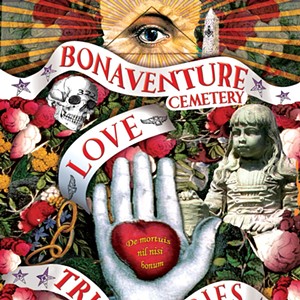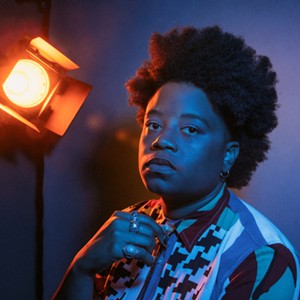With one song, "I Melt With You," Modern English earned a permanent berth in the New Wave Hall of Fame. The year was 1983.
Using a romantic motif and sweet strains of melancholy, lead singer Robbie Grey and his bandmates crafted an angsty pop song for the age of nascent MTV; like Simple Minds' similarly anthemic "(Don't You) Forget About Me," or Soft Cell's "Tainted Love," it's a 4-minute encapsulation of what Americans found so bloody cool about British bands in the early '80s.
From Colchester, home of the University of Essex, Modern English in 1979 was signed to nascent 4AD Records, the independent label that would deliver to the world the brooding Bauhaus, the exotic Cocteau Twins and other groundbreaking post-punk British bands.
In the States "I Melt With You" and the album it was hived off, After the Snow, didn't sell in the zillions, but they were popular enough (thanks to fanatical club- and MTV-play) to etch themselves into the zeitgeist of the times. These days, the strains of "I Melt With You" coming over the grocery store Muzak system is enough to bring it all rushing back.
Three years ago, Grey re-assembled the original version of Modern English for annual summer tours (some of the other guys have day jobs, and don't like to be away for long stretches; Grey spends the rest of the year at his second home, on an island off the southern coast of Thailand).
Modern English plays Dollhouse Productions Wednesday, Aug. 28, with an "80s-Themed Dance Party" to follow.
So why are you touring the States with the band — can't you just say "I don't need to do that anymore" and put your feet up in Thailand?
Robbie Grey: Creativity, that's why. Making music, writing words has always been my thing, really. I did stop for a few years, around the time I bought the house actually. But after three or four years of not doing music I was going a bit crazy. So I got back into it.
Wasn't there a "bogus" Modern English playing in America for a while? What's that story?
Robbie Grey: A guy I worked with on one album in the mid '90s started it ... he was very clever. It was when the Internet was first starting and people were writing out blogs and stuff like that. He managed to keep it quite well-presented, but he was basically saying he'd written "I Melt With You," he'd been in Modern English since the late '70s, early '80s, when I'd only worked with him on one album. So we had to set the lawyers on him a bit, and he's gone quiet since then.
Did that incident kick-start the reunion of the original band?
Robbie Grey: That was nothing to do with that, really. I was at my house in Thailand and I got this email from the bass player, Mick Conroy from the old days. Saying "I've just bought a houseboat, and this is where I live." And it just happened to be, literally, 30 minutes from where I live, by the sea in England. We met up to talk, and he was the one who suggested to get the band back together. So we spent a few months getting hold of everybody — and the rest is history, really.
You went on for a while, with different players. Why did it appeal to you after all this time to go back to what's essentially Square One?
Robbie Grey: It's difficult to explain. The '90s thing, I always call that Modern English II, I was the only original member. I still enjoyed touring, I still enjoyed going out on the road, spending endless days on motorways or backroads looking out the window. That still appealed to me. I was still quite young, I s'pose, relatively, and having no responsibilities all those things really appealed to me. I still really enjoyed it even though the audience numbers weren't as big, and record sales were nowhere as big.
But this was a different thing. This was all the original members, all back in a room. All the people who wrote "I Melt With You" and the After the Snow album, the Mesh and Lace album. It's got a chemistry to it which really works. So it was really appealing to all of us to get back into a rehearsal room to see what would happen.
Somewhere you'd told an interviewer that you were a "shouter" when the band started, in the late '70s, and that producer Hugh Jones "taught you how to sing." Was Modern English, in the beginning, more of a punk band?
Robbie Grey: You hit it on the nail. Before punk rock, we listened to music, we didn't make it. We'd listen to Bowie, Roxy Music, Kraftwerk, kind of left-field stuff, but we never dreamt of playing music until punk rock happened. And then anyone could play, you know what I mean? So we just got involved — bought instruments, started learning. We kind of learned our craft as we went along, which is what you hear from the Mesh and Lace album through the After the Snow album. Mesh and Lace is us on our own, all experimental and young and full of ideas, and After the Snow is Hugh Jones showing us the art of songwriting, really.
As an American, I've always wondered: For English kids, was it as historically simple as "The Sex Pistols and the Clash opened the doors"? Or was it more complicated than that?
Robbie Grey: Well, you gotta remember that we're a small country, Great Britain. So if something happens in London, you're going to know about it in a few days, or a week later, if you live in Glasgow, Manchester or Liverpool. It's such a fast-moving city, London. The Pistols and the Clash came out of London. And that really was it, the Pistols and the Clash, that's what was making a buzz. They were the bands that everyone thought "Wow — we could do that."
There were a lot of bands in that early '80s period who went on to be more successful than Modern English, but — to my mind — weren't necessarily better or more innovative. Did that cheese you off?
Robbie Grey: (laughing) I'm still cheesed off! That's another reason I keep making music. There's loads of books coming out about the 4AD label and the '80s music. I've been doing interviews with loads of people. And a lot of people have been very kind in saying that they never thought we got the kudos we deserved. In England, people liked the more experimental stuff. In America people liked "I Melt With You" and the After the Snow album. So I think in a lot of ways we've changed a little bit too much for some people's taste — if we'd have stuck to one sound, maybe we'd have been taken more seriously. But that's the impression I get, that there's a different kind of fan for different sorts of Modern English music.
Last question, and the obvious one, I guess. Has "I Melt With You" paid for your houses?
Robbie Grey: It's paid for everything. You know, these days there's no such thing as record sales or anything like that, so we kind of live off adverts on television, and film soundtracks. The publishing money we get is from things like that. We get money from the Burger King advert. The Hershey Bar one ran for three years; we've made a lot of money out of that. So it helps us to keep making our music, really.

